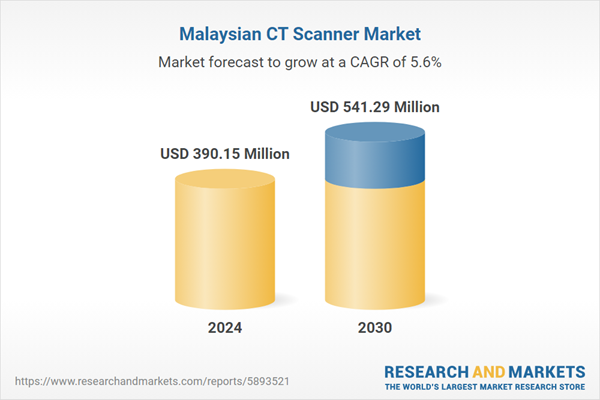Speak directly to the analyst to clarify any post sales queries you may have.
10% Free customizationThis report comes with 10% free customization, enabling you to add data that meets your specific business needs.
The CT scanner market in Malaysia is expected to grow significantly in the coming years, driven by factor such as increasing healthcare spending. Malaysia came in first place with a score of 95 out of 100, in the Best Healthcare in the World category of the 2019 International Living Annual Global Retirement Index. Healthcare providers are anticipated to make significant investments in new and sophisticated imaging technologies to enhance patient care due to the rising demand for advanced medical technology like CT scanners. Thus, it is anticipated that the Malaysian CT scanner market will expand.
Key Market Drivers
Rising Prevalence of Chronic Diseases
Malaysia is witnessing a surge in chronic non-communicable diseases (NCDs) such as cardiovascular diseases, cancer, and diabetes. According to the National Health and Morbidity Survey 2019, approximately 30% of Malaysian adults have hypertension, a significant risk factor for heart disease. Additionally, the National Cancer Society Malaysia reported an estimated 36,000 new cancer cases annually in 2022.These conditions necessitate advanced diagnostic tools for early detection and management, positioning CT scanners as essential equipment in modern healthcare facilities. The Malaysian government's increased healthcare expenditure, including allocations for upgrading medical facilities with advanced diagnostic equipment, underscores its commitment to combating NCDs. This proactive approach not only enhances patient outcomes but also propels the demand for CT scanners across the country.
Key Market Challenges
High Cost of Equipment and Maintenance
The acquisition and maintenance of CT scanners involve substantial financial investment. Advanced CT scanners can cost between $125,000 to $500,000, excluding expenses related to installation, operation, and regular maintenance. Such high costs pose a significant barrier for smaller hospitals and clinics, particularly in rural areas with limited budgets. Additionally, the need for specialized infrastructure, such as radiation-shielded rooms and stable power supplies, further escalates the overall expenditure. While the government provides funding for public healthcare facilities, private institutions often rely on their resources, making it challenging to invest in high-end diagnostic equipment. This financial constraint limits the widespread adoption of CT scanners, affecting the overall growth of the market.Key Market Trends
Technological Advancements in CT Imaging
The CT scanner market in Malaysia is experiencing a technological evolution, with healthcare providers increasingly adopting multi-slice CT scanners that offer faster scan times, higher-resolution images, and reduced radiation exposure. These advancements enhance diagnostic accuracy and patient safety, making CT scans more appealing to both clinicians and patients. Moreover, the integration of artificial intelligence (AI) in CT imaging is gaining traction, aiding in image reconstruction, anomaly detection, and workflow optimization. Such innovations not only improve diagnostic capabilities but also streamline operations, making CT imaging more efficient and accessible.Key Market Players
- Siemens Healthcare Sdn. Bhd.
- FUJIFILM Malaysia Sdn. Bhd.
- Philips Malaysia Sdn Bhd
- GE HealthCare
- SIA ARBOR MEDICAL
- CANON MEDICAL SYSTEMS MALAYSIA SDN. BHD.
- Shimadzu Malaysia Sdn. Bhd.
- Code Medical System Sdn Bhd
- Nano Medic Care Sdn. Bhd
- I-MEDIC IMAGING SDN. BHD
Report Scope:
In this report, the Malaysia CT scanner market has been segmented into the following categories, in addition to the industry trends, which have also been detailed below:Malaysia CT Scanner Market, By Technology:
- 16-slice
- 32-slice
- 128 & Above slice
- 64-slice
- 8-slice
- Less than 8 slices
- Others
Malaysia CT Scanner Market, By Mobility:
- Fixed
- Mobile
Malaysia CT Scanner Market, By Device Architecture:
- O-Arm
- C-Arm
Malaysia CT Scanner Market, By Source:
- Domestic
- Import
Malaysia CT Scanner Market, By Application:
- Cardiology
- Oncology
- Neurology
- Others
Malaysia CT Scanner Market, By End User:
- Hospitals
- Diagnostic Centers
- Others
Malaysia CT Scanner Market, By Region:
- East Malaysia
- West Malaysia
Competitive landscape
Company Profiles: Detailed analysis of the major companies in Malaysia CT scanner market.Available Customizations:
With the given market data, the publisher offers customizations according to a company's specific needs. The following customization options are available for the report.Company Information
- Detailed analysis and profiling of additional market players (up to five).
This product will be delivered within 1-3 business days.
Table of Contents
Companies Mentioned
The leading companies profiled in this Malaysia CT Scanner market report include:- Siemens Healthcare Sdn. Bhd.
- FUJIFILM Malaysia Sdn. Bhd.
- Philips Malaysia Sdn Bhd
- GE HealthCare
- SIA ARBOR MEDICAL
- CANON MEDICAL SYSTEMS MALAYSIA SDN. BHD.
- Shimadzu Malaysia Sdn. Bhd.
- Code Medical System Sdn Bhd
- Nano Medic Care Sdn. Bhd
- I-MEDIC IMAGING SDN. BHD
Table Information
| Report Attribute | Details |
|---|---|
| No. of Pages | 70 |
| Published | September 2025 |
| Forecast Period | 2024 - 2030 |
| Estimated Market Value ( USD | $ 390.15 Million |
| Forecasted Market Value ( USD | $ 541.29 Million |
| Compound Annual Growth Rate | 5.6% |
| Regions Covered | Malaysia |
| No. of Companies Mentioned | 11 |









